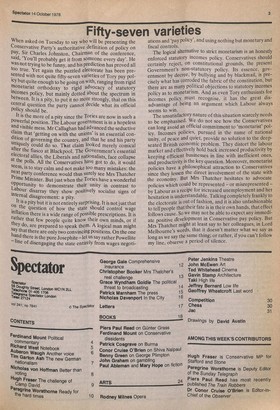F ifty- seven varieties
When asked on Tuesday to say who will be presenting the Conservative Party's authoritative definition of policy on pay, Sir Charles Johnston, Chairman of the conference, said, 'You'll probably get it from someone every day'. He was not trying to be funny, and his prediction has proved all too true. Yet again the puzzled electorate has been presented with not quite fifty-seven varieties of Tory pay policy but quite enough to be going on with, ranging from rigid monetarist orthodoxy to rigid advocacy of statutory incomes policy, but mainly dotted about the spectrum in between. It is a pity, to put it no more strongly, that on this central question the party cannot decide what its official Policy should be.
It is the more of a pity since the Tories are now in such a Powerful position. The Labour government is in a hopeless and visible mess. Mr Callaghan had advanced the seductive claim that 'getting on with the unions' is an essential condition of governing the country, and that he and his party uniquely could do so. That claim looked merely comical after the fiasco at Blackpool. The Government's essential electoral allies, the Liberals and nationalists, face collapse at the polls. All the Conservatives have got to do, it would seem, is to stay calm and not make too many mistakes: the next party conference would thus surely see Mrs Thatcher Prime Minister. But just when the Tories have a wonderful
o PPortunity to demonstrate their unity in contrast to Labour disarray they show positively socialist signs of internal disagreement: a pity. It is a pity but it is not entirely surprising. It is not just that o n the question of how the state should control wage
inflation there is a wide range of possible prescriptions. It is
rather that few people quite know their own minds, or if they do, are prepared to speak them. A logical man might say that there are only two convincing positions. On the one hand there is the pure Josephite —let us say rather Powellite — line of disengaging the state entirely from wages negoti ations and 'pay policy', and using nothing but monetary and fiscal controls.
The logical alternative to strict monetarism is an honestly enforced statutory incomes policy. Conservatives should certainly reject, on constitutional grounds, the present Government's non-statutory policy. Its essence, government by decree, by bullying and by blackmail, is precisely what has corroded the fabric of the constitution, but there are as many political objections to statutory incomes policy as to monetarism. And as even Tory enthusiasts for incomes policy must recognise, it has the great disadvantage of being an argument which Labour always
seems to win.
The unsatisfactory nature of this situation scarcely needs to be emphasised. We do not see how the Conservatives can long avoid an official commitment to 'monetarist' policy. Incomes policies, pursued in the name of national unity, of peace and quiet, provide no solution to the deepseated British economic problem. They distort the labour market and effectively hold back increased productivity by keeping efficient businesses in line with inefficient ones, and productivity is the key question. Moreover, monetarist policies have a philosophical attraction to Conservatives since they lessen the direct involvement of the state with the economy. But Mrs Thatcher hesitates to advocate policies which could be represented — or misrepresented — by Labour as a recipe for increased unemployment and her hesitation is understandable. Talking completely frankly to the electorate is out of fashion, and it is also unfashionable to tell people that their fate is in their own hands, that effect follows cause. So we may not be able to expect any immediate positive development in Conservative pay policy. But Mrs Thatcher might at least say to her colleagues, in Lord Melbourne's words, that it doesn't matter what we say as long as we say the same thing; or rather, if you can't follow my line, observe a period of silence.


































 Previous page
Previous page